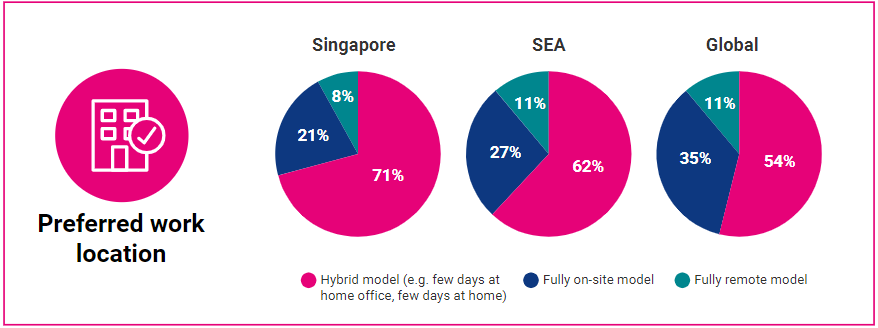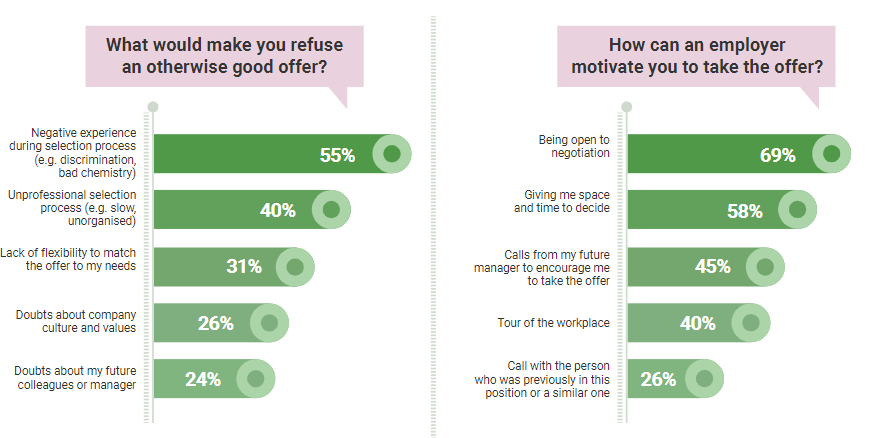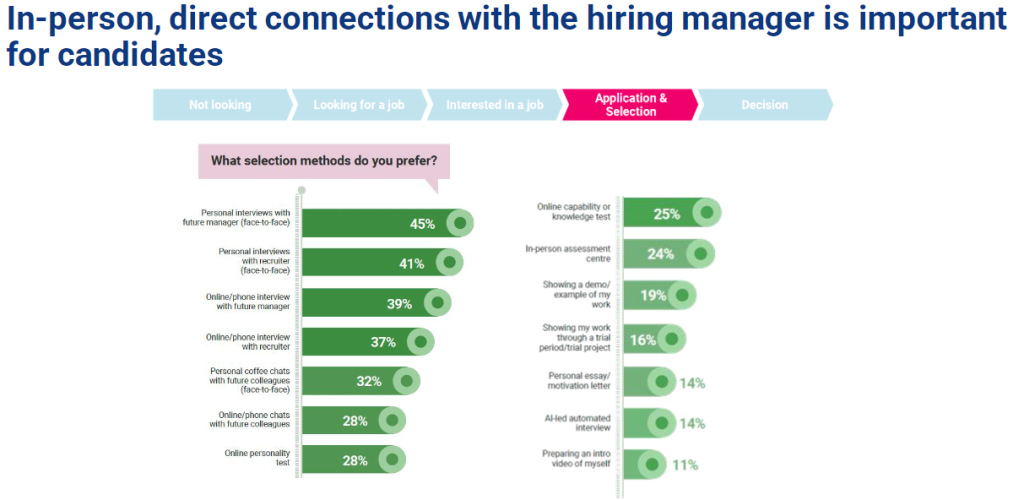[ad_1]
Job platform JobStreet’s father or mother firm SEEK launched a brand new examine on Wednesday (March 1) in collaboration with Boston Consulting Group, detailing modifications within the labour market and worker expectations in Southeast Asia (SEA).
The examine, titled “What Jobseekers Want Employers Knew: Unlocking the Way forward for Recruitment”, concerned a survey of over 90,000 people throughout Singapore, Malaysia, Indonesia, Thailand, the Philippines and Hong Kong.
On the launch occasion, CEO of SEEK Asia Peter Bithos, Accomplice and Affiliate Director of BCG Sagar Goel, and Managing Director of JobStreet Singapore Chew Siew Mee, had been current to spotlight a number of key takeaways from the report.
These are a number of the key findings from their report:
- One in three individuals in SEA are in search of a brand new job, with greater wage and seniority being prime causes for making the swap.
- Skills are assured in in search of new alternatives regardless of international uncertainty, with 62 per cent feeling that they’re in a powerful negotiating place when in search of jobs.
- 71 per cent of respondents say that above all, they want a secure job with good work-life steadiness.
- Superior synthetic intelligence (AI) instruments getting used for recruitment usually are not favoured amongst workers, even among the many youthful era. Solely 24 per cent are snug having an automatic AI-led interview.
- 55 per cent of jobseekers would refuse an in any other case good provide if they’d a unfavourable expertise throughout recruitment.
The makings of an employer’s market are right here, but it surely’s nonetheless a jobseeker’s market
The examine itself comes at a turning level for each employers and workers. The previous few months have seen large layoffs from tech firms like Google and Meta, whereas the world is steadily reopening and adapting to a ‘dwelling with Covid’ technique.
On the identical time, there stays some uncertainty within the international financial system, as fears of an upcoming recession are nonetheless very a lot current.
These elements, based on SEEK’s Peter Bithos, typically work in favour of employers by giving them a stronger hand on the bargaining desk – however not this time.
When confronted with a attainable recession, the steadiness of energy within the labour market tends to shift in the direction of employers as hiring tightens. Nevertheless, we consider the state of affairs is completely different this time as many organisations in Asia are nonetheless recovering from the roles misplaced through the pandemic.
Whereas hiring progress might decelerate throughout occasions of uncertainty, there is no such thing as a doubt that it’s nonetheless a jobseekers’ market proper now, and so it’s necessary for employers to know find out how to entice, recruit and retain expertise.
– Peter Bithos, CEO of SEEK Asia

The examine itself confirmed that 34 per cent of skills had been actively looking for a brand new job, citing points corresponding to a want for a extra fascinating place, an absence of alternatives for profession development at their present place, and dissatisfaction with wage and advantages at their present firm.
Recruiters are additionally reaching out to those that usually are not actively looking for a brand new job, with 75 per cent of all staff indicating that they’re approached a number of occasions a 12 months with job provides. In sectors corresponding to IT, skills are approached on a month-to-month and even weekly foundation.
Workers are additionally extra assured about negotiating the phrases of their employment as effectively, with round 70 per cent of skills believing that they’re in a powerful place to barter for his or her desired salaries and advantages.
Nevertheless, Bithos clarified that this didn’t imply that workers need to dictate their phrases to employers in a ‘my approach or the freeway’ style, however are as a substitute keen on having a dialogue with potential employers about these phrases.
Assume twice earlier than calling your staff again to the workplace
Whereas many employers could also be eager to see their staff again within the workplace as per pre-Covid preparations, plainly many workers usually are not too eager to return to this association.
Whereas globally, 54 per cent of staff indicated a choice for hybrid working (splitting time between working from dwelling and dealing within the workplace), SEA – particularly these from Singapore – appear to essentially take pleasure in the advantages of it.
62 per cent of Southeast Asian respondents and 71 per cent of Singaporeans most well-liked the hybrid mannequin, with solely 21 per cent of Singaporeans preferring to move to the workplace on daily basis and eight per cent preferring to be absolutely distant. This, based on Bithos, signifies an necessary growth, with some caveats.

Whereas the times of managers strolling round an workplace and peering over your shoulder to verify if you’re working or idling could also be over, staff usually are not precisely against coming into the workplace – they simply don’t need to have to try this 5 days every week, 10 hours a day, 52 weeks a 12 months.
They perceive the significance of assembly and interacting with colleagues, subordinates, and superiors, however additionally they need to have the ability to have the flexibleness to work remotely as and once they can.
At SEEK, we’re absolutely hybrid now – we do set expectations that we come collectively generally, at a staff degree, at an workplace degree, or generally at an organization degree. These are necessary rituals, however because it seems, workers really feel the identical approach as effectively.
What the statistics present is that individuals are saying ‘I like connectivity. I like being a part of the group. I need to take part within the tradition in my organisation at work. I simply don’t need to be beholden to try this on daily basis.
– Peter Bithos, CEO of SEEK Asia
On the identical time, calls for for work-life steadiness are starting to climb the rankings of jobseekers’ priorities in terms of deciding the place to take their providers.
71 per cent of survey respondents acknowledged that above all, they want a secure job with good work-life steadiness, and 17 per cent listed an absence of work-life steadiness as a deal breaker in accepting a suggestion, ranked second solely to monetary compensation at 22 per cent.
Hybrid working elements into this too. As Bithos identified, commuting to work in different nations might not be so simple as taking the MRT.
“In Singapore, hybrid working can appear to be an incremental profit. However in case you’re dwelling in Jakarta or Bangkok or Kuala Lumpur, it’s a special story. Folks in Jakarta can commute as much as two hours a day to get to work,” he defined.
“And while you’re truly in a position to spend three days every week working from dwelling, that could be a materials distinction to your high quality of life.”
It takes extra than simply an interview in terms of recruiting expertise
They are saying that an interview is a two-way road. On one hand, employers use an interview to gauge an applicant’s angle and aptitude, whereas workers are provided an opportunity to clear any doubts that they may have about becoming a member of the corporate.
But, the report reveals that for employers, the interview might start even earlier than the worker sits down and activates their webcam.
A majority of candidates would reject an in any other case enticing provide in the event that they had been made to really feel uncomfortable or in any other case had a unfavourable expertise throughout their interview.

67 per cent of respondents cited a clean and well timed course of because the primary approach for an employer to face out throughout recruitment, and 55 per cent mentioned {that a} “unfavourable expertise throughout recruitment” was a key purpose why they refused an in any other case enticing provide.
On the identical time, even the digital native youthful staff usually are not followers of interacting with AI and recruitment bots.
Many nonetheless desire a human contact in terms of interviews and recruitment, with solely 24 per cent of workers indicating that they’d be snug with an AI-led automated interview.

And whereas some candidates recognize being given time and house to think about their choices after being provided a job, many nonetheless anticipate some openness to barter and recognize calls from their future managers whereas making the choice.
What does this imply for employers shifting ahead?
Definitely, many of those developments might come as a shock for a lot of employers.
That is reflective of shifting priorities as youthful members of society be part of the workforce, and employers threat falling behind if they don’t adapt to those altering circumstances.
Worker expectations are more and more at odds with employer expectations, however this can be a state of affairs that may be remedied. SEEK has offered a number of suggestions for employers on find out how to higher deal with these modifications, and are available out forward within the expertise struggle.
Bettering your job listings, getting your tradition fundamentals proper, and overcoming biases can improve the variety of skills which are out there to you, and assist fill gaps that may in any other case stay.
Hiring new skills, growing present skills, and retaining them in the long term are all necessary processes in sustaining the corporate’s expertise pipeline, and within the modern-day, this process is tougher than ever.
Nevertheless, this path shouldn’t be one which you need to stroll on their lonesome. SEEK’s full report incorporates additional insights as to what workers worth, and what they anticipate, in addition to suggestions on find out how to meet them as an employer – this is usually a priceless instrument in your arsenal as you navigate the more and more troublesome job of profitable the expertise struggle.
readers can obtain the report right here.
This text was written in collaboration with JobStreet by SEEK.
[ad_2]
Source link



